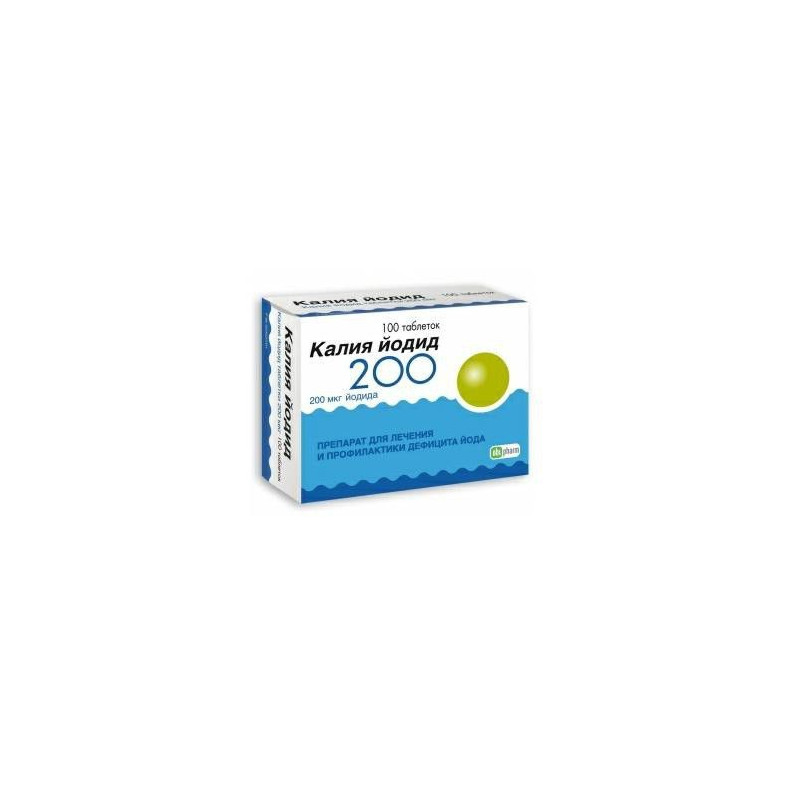



 All payments are encrypted via SSL
All payments are encrypted via SSL
 Full Refund if you haven't received your order
Full Refund if you haven't received your order
Pills
1 pill contains potassium iodide 0,262 mg, in terms of iodide, respectively, 0,200 mg.
Excipients: lactose (milk sugar), Magnesium hydroxycarbonate (magnesium carbonate basic), microcrystalline cellulose, sodium croscarmellose, magnesium stearate, talc, colloidal silicon dioxide (aerosil).
100 pieces.
Potassium iodide is an iodine-containing drug that compensates for Iodine deficiency, stimulates the synthesis and release of TSH. It prevents the accumulation of radioactive iodine in the thyroid gland and ensures its protection against the action of radiation, and prevents the development of hyperplasia of the thyroid gland.
Endemic goiter. Prevention of diseases caused by iodine deficiency (endemic goiter, diffuse goiter, euthyroid, during pregnancy, the state after goiter resection).
Hypersensitivity, hyperfunction of the thyroid gland pronounced or hidden (including diffuse and nodular toxic goiter), toxic adenoma, and others. Benign tumors of the thyroid gland. With caution. During's herpetiform dermatitis, renal failure, pregnancy (with the exception of the threat of radioactive iodine, are prescribed together with potassium perchlorate),lactation period (at doses above 300 mcg / day), children's age.
In pregnancy, use is possible only in recommended doses, since iodine crosses the placenta and can cause the development of hypothyroidism and goiter in the fetus.
Iodine is excreted in breast milk. When applied to the mother during lactation in doses of more than 1 mg / day, there is a risk of developing hypothyroidism in an infant.
Potassium iodide is taken orally, after meals, with plenty of fluid. Goiter treatment for adults and children from 12 years old - 300-500 mcg / day, for children up to 12 years old - 100-200 mcg / day. For the prevention of goiter with iodine deficiency: adults and children from 12 years old - 100-200 mcg / day, children under 12 years old (including newborns) - 50-100 mcg / day, pregnant and lactating - 150-200 mcg per day Prevention of relapse after therapeutic treatment of iodine deficient goiter - 100-200 mg / day. After surgical treatment of goiter in newborns, children and adolescents - 100-200 mcg / day. The duration of treatment is determined by the doctor; prophylactically, adults are usually prescribed for several months, years, or a lifetime; children and adolescents - usually within 6-12 months.
Allergic reactions: in rare cases - skin rash, angioedema, allergic arthritis, eosinophilia, lymphadenopathy. On the part of the digestive system: rarely - diarrhea, nausea, vomiting, toothache, swelling of the salivary glands, hypersalivation. The phenomena of "iodism" (rarely on the background of long-term therapy): hyperemia of the mucous membrane of the oral cavity, pharynx, stomach, metallic taste in the mouth, headache, skin rash, sore gums,toothache, rhinitis (swelling of the mucous membrane of the nasal cavity), conjunctivitis, bronchitis, iodine fever, iodine acne. Others: thyrotoxicosis (at doses above 300 mcg / day), hypothyroidism (with high-dose therapy - more than 1 mg / day).
Long-term treatment with doses of iodine above 1 mg / day causes a decrease in iodine uptake by the thyroid gland and the synthesis of thyroid hormones, which later manifests itself in the form of hypothyroidism and the onset of goiter. In pregnancy, use is possible only in recommended doses (when iodine intake from food is less than 150-300 mcg / day), since iodine crosses the placenta and can cause the development of hypothyroidism and goiter in the fetus. Iodine is excreted in breast milk, so when used during lactation in doses of more than 1 mg / day, there is a risk of hypothyroidism in an infant. During therapy, patients with renal insufficiency may develop hyperkalemia.
The inclusion of iodine in the thyroid gland is suppressed by potassium perchlorate (at concentrations in the blood exceeding 5 mg / ml) and stimulated by TSH. Simultaneous use with potassium-sparing diuretics can lead to hyperkalemia, arrhythmias, cardiac arrest; with drugs Li + - to the development of goiter and hypothyroidism. ACE inhibitors (including Captopril, Enalapril, lisinopril) increase the risk of hyperkalemia. Antithyroid drugs weaken the effect (mutually). Reduces seizure of the thyroid gland 131I and 123I.
In a dry place, at a temperature not higher than 25 ° C.
3 years.
Potassium iodide